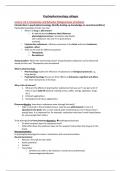College aantekeningen
Uitgebreide college aantekeningen psychopharmacology
Vorig jaar heb ik het vak psychopharmacology met een 9,5 afgerond! Ik heb toen uitgebreide hoorcollege aantekeningen gemaakt. De stof is dit jaar identiek op 1 college na. Dit betreft college 12 over hormonen. Deze aantekeningen heb ik dus niet.
[Meer zien]





